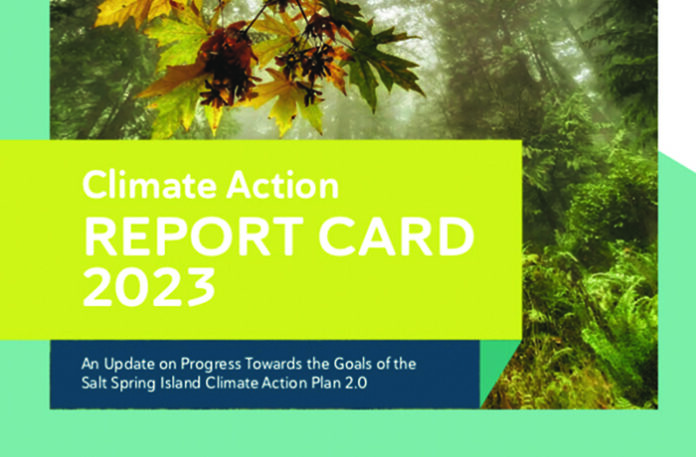Transition Salt Spring (TSS) has taken its show on the road, so to speak, sharing results from the group’s latest findings in the form of the Salt Spring Island Climate Action Report Card 2023 — a presentation, certainly, but also importantly a listening tour, according to TSS chair Bryan Young.
Young and TSS brought the report card to ASK Salt Spring late last month, as an update on progress toward goals set previously with the Salt Spring Island Climate Action Plan 2.0. They’ve met with various local officials individually since, Young said, and will be presenting to the Salt Spring Island Local Trust Committee at its Oct. 12 meeting. They have also set a roundtable for community service organizations on Oct. 17.
These programs include a briefing, but are really designed to construct shared priorities, Young said — asking members of each group what goals they have that overlap with matters in the report card, and how TSS can support them.
“It’s a listening position,” said Young, “with a mind to say, ‘OK, which priorities are we going to agree on together?’ Then we take those messages to our next set of conversations with our local elected officials and tell them this is the consensus that came out.”
Among the first messages policy-makers and other readers will find is this: overall there’s been a good start, but we need to do more, and soon.
“Not enough is happening,” said Young, pointing to Intergovernmental Panel on Climate Change forecasts and climate events over the past few years. “All of the lights on the dashboard are flashing amber, or worse.”
According to the report card, Salt Spring is “not on track” to meet either targeted emission reductions nor climate change adaptation goals set out in 2021 for 2030 — despite what it called “notable progress” in several areas. For example, transportation pollution reduction goals are being advanced through local and regional efforts on bike lanes and electrification, but targets for reducing single-person vehicle trips remain out of reach.
Setting targets for broad goals — involving similarly broad topics, like food security or infrastructure hardening — can feel overwhelming for individuals and even large organizations, Young said, but the group’s granular information trove of policy and programs can help groups dial into specific action.
“We have a climate action policy and programs database we’re using,” said Young. “It’s nimble; we’re able to show people a slice of that database, ask officials where they are on things that are in their work plan, and show places we can help.”
That offer of help is part of TSS’s emphasis on going beyond mere criticism — to not just point out where something is falling short but to come up with ideas to improve things.
“No opposition without proposition,” chuckled Young. “We cannot afford to just be critical at this point. I think it behooves anybody who opposes something to be also proposing a solution at the same time.”
Young puts climate change adaptation for infrastructure and ecosystems at the top of the list, he said — pointing to recent conversations with staff at the Ministry of Transportation and Infrastructure that yielded new ideas on diverting roadway water runoff in more natural ways that protect Salt Spring’s drinking water as much as road surfaces. But there’s an economic angle to the work as well, he said — often surprising critics.
“This is about being shrewd, creating economic opportunities for islanders to do things with forests and watersheds to help make them more resilient,” said Young. “There’s a lot of appetite from the public to know more, but we still need to have some deeper conversations.”
Climate change is obviously a problem much bigger than Salt Spring, Young said, but he emphasized it’s going to be local people and organizations who ultimately protect their own communities — and it’s conversations that bring people together that need to be encouraged, he added, not the ones that drive us apart.
“We don’t have time anymore to be fighting each other,” said Young. “We need to be reaching across divisions, and having real conversations about how we can help each other. We cannot afford to orphan any voices in our community.”
“Everything we do to adapt ourselves and reduce emissions helps make it easier for my son, my daughter and future families living on this island,” continued Young. “The slower we act, the more difficult it’s going to be. We need to be strong with each other right now.”
The Climate Action Report Card can be read online at transitionsaltspring.com.

